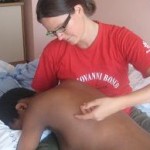
In Xhosa culture, cattle and goats are sacred because they provide meat, milk, hides for clothes and symbolise the unity between the human material world and the spiritual world of universal gods and the ancestors. When a baby is born, she slips through the two worlds as it were into the present social community, bringing gifts of character and recent connections with the spirit world and even ancestors that will, over time, differentiate her from any other human being.
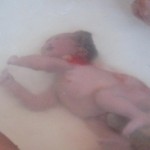
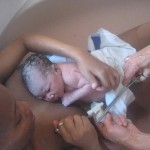
The baby is then breastfed by the “Umdlezana”, the mother.
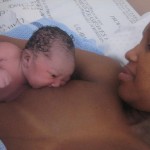
“Inkaba” is the ritual of burying the cord and the placenta and this has great significance to the clan and seals the attachment of the baby to her ancestral lands. “Inkaba” then comes to mean one’s ancestral home and symbolises the relationship between the individual, his/her clan, the land and the spiritual world. The burial place of an ‘Inkaba’ is a place where one must go and dream and communicate with ancestors.
The ritual of “Imbeleko” is the ceremony welcoming the child into the greater community, when a goat is slaughtered and the clan is invited to attend the feast. The skin of the goat then becomes a sacred item for the new clan member, the baby, who will sleep on it in the future in times of trouble, signifying a desire for connection with the ancestors.
The baby will be named with a family prefix, or suffix and may be named to signify events, like a thunderstorm or lightening, or wishes the family may have like “Hope” or “Themba”. A clan “Praise-Singer”, who is comparative to a Bard in celtic culture, will call upon the ancestors and vocally elaborate on all the ancestors’ feats of excellence and praiseworthy qualities, so as to imbue the new member of the clan with a sense of her responsibility to the group at an early age. In my culture the term may be “I am because you are”!
It is always a privilege for me to assist at the births of my African sisters, as I try to imbue the experience with more humanity than they are used to. There is very little data about traditional rituals around the birth of the peoples of Southern Africa. Women nowadays, are encouraged to give birth in hospital and very few women take their placentas home. This is to me perhaps symbolic of many people being displaced from their ancestral homes, which indeed they have been, since the first western European settlers arrived in Cape Town from Holland in 1652.
I do have access, though, to a collection of remarkable art photographs by a man called Lister Hunter. I include the link below:
http://www.ezakwantu.com/Gallery%20Lister%20Hunter%20Photo%20Set%20F%20-%20Birth.htm
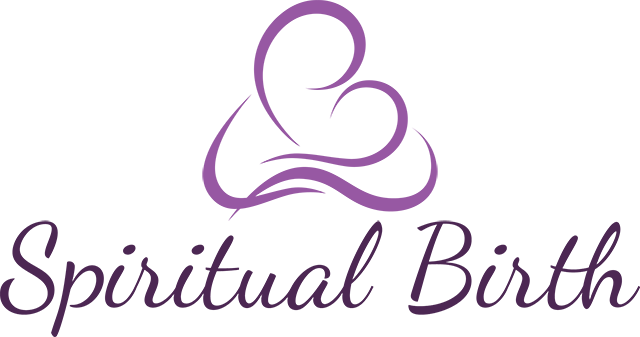
Thank you for a very informative lecture.We need such information.an unmarried girl who gives birth to a child to my knowledge when having the imbeleko for the child will have to contact the father and the whole ritual will be done according to the father’s tradition not the mother’s because we are as xhosas a patriarchal society.Thank your again.
Can I make imbeleko for my daughter after I had paid the damages, even though I am not married to the mother of my child?
Dear Mangi, I am sure you could as long as it is done with honour for the child and with permission of the mother of the child. Perhaps you will bring about good changes to the traditions.
No, you cannot. In our culture, a child born born to an unmarried mother belongs to the mother’s family, they take on their mother’s surname and all traditional ceremonies are handled by the mother’s family.
Thanks Lulu for clarifying this. It is also the law of the country that the mother is supported legally. The father however can contest this in court and secure his rights as a father.
Hi can I have imbeleko if the damages were never paid for me
Prepoal first. Of an assignment on ritual of imbeleko
It’s good explainable
Needs more info
What would you like to know?
this is quiet interesting ndichadile ngemfazi wesiXhosa she says she wants to give birth in their cultural way although she is a nurse by profesion.i respect her culture as much as she does mine
beautiful piece… i would like more..
Thanks Champ – will have a look
Thank you for this Marianne. This is very helpful.
What advice would you give someone who has not had anyone from their clan to aid in their coming into the world, but had someone who is from another African clan (example: Yoruba) perform birthing rituals that are of their own clan (example: Yoruba), is this enough? Or would the one who has been birthed still have to go through their specific clans rituals as an adult?
Also what happens in the event that a child is born in a hospital but there are complications (example: child is born not breathing) resulting in the child having to remain in hospital for a few weeks after birth?
Dear Samsung, Thank you for reading and commenting on this article. The rituals around birth in indigenous communities are ways of celebrating the phenomenal transition through birth into life on earth. Redoing the rituals in your own culture may help with a sense of belonging if you have been separated from your roots. And it is possible to create ritual when a sick baby has recovered and returned home, to welcome him to the community and culture of his people. Arranging a gathering to bless the baby reconnects the parents and baby with their purpose on earth. I hope this helps. Blessings Marianne
I am glad I found this article. The burial of the umbilical cord under a tree is still practiced in Haiti, with the same meaning as for the Xhosa babies. Very useful. Thank you.
This is helpful but I want to now about imbeleko yesixhosa eyenziwayo nge gusha
This is so helpful, what advise could you give to someone who has never had birth rituals, can I still do this in my old age.
Dear Nonzuzo
I am sure you can still do your birth rituals by returning to the place where you were born with someone who is close to you and burning some Mpephu leaves w2ith prayers and meditation to connect with your ancestors. It is best if you can take several weeks to meditate and reconnect with yourself and where you come from. To reassess your purpose in this lifetime and gather your energies for the fulfillment of your future. Just to be who you are is enough, and reconnecting through nature is important. Walk barefoot on the earth, go into the countryside and smell the scents at dawn and dusk. Watch the sun as it rises and sets. Simple things. Yet profound. Blessings on your journey Dear One.
This is so helpful in so many ways. A book should be written to teach us about such.
I am so glad that sensitive spiritual midwifery is being practiced in Cape Town . unfortunately this is not the case in private obstetric led care. Thank you Marianne for reminding me about what is possible. i would love to be able to practice the art of water birth again.